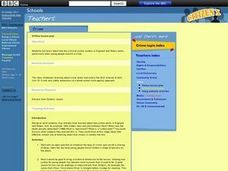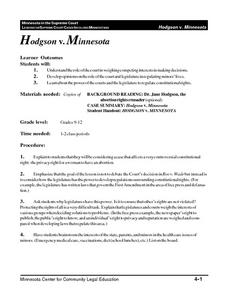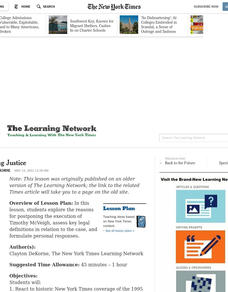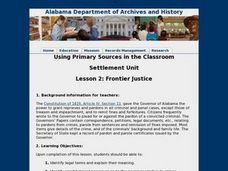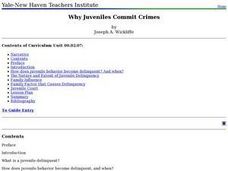American Documentary
The Benefits and Drawbacks of Plea Bargains
The outcome of 90 percent of criminal cases in the US is determined by plea bargains. Clips from the documentary Better This World create the backdrop for an investigation of the benefits and drawbacks of the plea bargaining process....
BBC
Crime: Justice
Are the juvenile courts fair? Learners read a bit from the classic Oliver Twist to consider how young people are treated and represented when they've been accused of a crime. They read a case study from their books, discuss children's...
Curated OER
Hodgson v. Minnesota
Students investigate the role of and develop opinions of the court in weighing competing interests in making decisions. They examine the power of the courts and legislature to regulate constitutional rights.
Curated OER
Moot Court Preparation
Twelfth graders prepare themselves for a mock moot court. In groups, they are presented with an overview of each activity and research appellate cases related to the topic given to them. They identify regions of the country that have...
Curated OER
Civil Rights and the Michigan Supreme Court II
Students view a PowerPoint presentation on the Michigan Supreme Court Historical Society's Civil Rights and/or the Native American Rights. They write a reaction paper and prepare for a class discussion. They work in groups and discuss...
Curated OER
the International Criminal Court's History And Uses
Students analyze and come to explain the history behind the formation of the International Criminal Court, along with the recent controversy facing the Court; and current crises that warrant the Court's attention.
Curated OER
Criminal Law -- Miranda
Students examine the law and the Miranda rights. They role play members of law enforcement and ones being arrested.
Curated OER
Ghosts of Rwanda: Reconciliation and Reparations
Students examine a specific case of genocide participation in Rwanda. Working in groups, they simulate the courtroom drama, from the positions of victim, perpetrator, and court monitor. They conclude by writing essays on the...
Curated OER
Still Burning
Young scholars study about an infamous 1964 crime and discuss opinions on a recent verdict in the case from different perspectives.
Curated OER
Children's Accountability for Their Crimes
Learners participate in a round-table discussion about the juvenile justice system and investigate the 'age of accountability' debate. They write a persuasive essay supporting or refuting the punishment received by the children discussed...
Curated OER
Symbolic Speech
Ninth graders consider the right of freedom of speech as it is outlined in the U.S. Constitution. They receive background information for the US Supreme Court, the Bill of Rights, and free speech. They discuss a series of actual cases...
Curated OER
Teachers: Citizenship: Criminal Justice System
Students, in groups, study Asbos and their conditions. After watching a 10-minute video, they answer questions in the Asbo hotseat. Also, they develop arguments that are not necessarily their own.
Curated OER
What Makes a Good Law?
Why were laws created? Spark a group discussion on why we need laws to co-exist. Should the sale of some things be outlawed on Sundays? Read a case summary between Target and the state of Minnesota that debated this issue. Ask your...
Curated OER
Executing Justice
Young scholars explore the reasons for postponing the execution of Timothy McVeigh, assess key legal definitions in relation to the case, and formulate personal responses.
Curated OER
Mock Trial
Students rewrite a traditional fairy tale to represent the viewpoint of the villain. They participate in a mock trial of that villain in which all regular court participants (judge, jury, defendant, witnesses, plaintiff, etc) play roles.
Ken Taylor
The Stones: Guilty or Not Guilty?
Young drama pupils will perform a number of expressive speaking exercises as they consider the themes of responsibility, consequences, and justice in the very modern Australian play The Stones. With a lot of role playing and...
Curated OER
Hydraulic Mining Offline Lesson
Students utilize a variety of source materials to explore reasons for supporting or opposing hydraulic mining. A mock court hearing is held where a decision to allow the continued use of hydraulic mining is made.
Curated OER
The Jury System
Students analyze Article III and the Seventh Amendment. In this US Justice lesson plan, students research the US jury system and complete a Student Jury questionnaire. Students will discuss the impact the implementation of the Jury...
Curated OER
dsfa
Students work in groups examining the school's policy of no weapons on school property.
Curated OER
Parental Accountability and Public Policy
Students examine laws that relate to parental accountability for minors. Students debate these laws and identify their own personal opinions regarding parental civil and criminal liability. Students draft legislation that reflects their...
Curated OER
Who Serves Time? Breaking Down Stereotypes About Juvenile Offenders
Students read and discuss article "Doing Time," explore juvenile justice system and juvenile hall, and discuss stereotypes of young offenders.
Curated OER
Frontier Justice
Learners make an investigation into the Constitution of 1819, Article IV, Section II, gave the Governor of Alabama the power to grant reprieves and pardons in all criminal and penal cases, except those of treason and impeachment, and to...
Curated OER
Plea Bargaining
Students explore plea bargaining and list the advantages and disadvantages of it.
Curated OER
Why Juveniles Commit Crimes
Students examine the reasons why juveniles commit crimes. As a class, they watch movies showing juveniles committing crims and discuss the impact on societies. They take a field trip to adult and juvenile courts and compare their...



